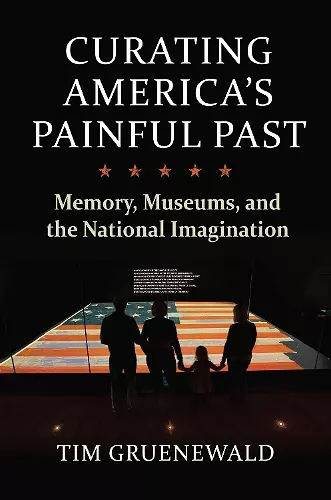Curating America's Painful Past
Memory, Museums, and the National Imagination
Format:Hardback
Publisher:University Press of Kansas
Published:30th Jul '21
Currently unavailable, our supplier has not provided us a restock date

During the global BlackLivesMatter protests of 2020, many called upon the United States to finally face its painful past. Tim Gruenewald’s new book is an in-depth investigation of how that past is currently remembered at the national museums in Washington, DC. Curating America’s Painful Past reveals how the tragic past is either minimized or framed in a way that does not threaten dominant national ideologies. Gruenewald analyzes the National Museum of American History (NMAH), the United States Holocaust Memorial Museum (USHMM), the National Museum of African American History and Culture (NMAAHC), and the National Museum of the American Indian (NMAI).
The NMAH, the nation’s most popular history museum, serves as the benchmark for the imagination of US history and identity. The USHMM opened in 1993 as the United States’ official Holocaust memorial and stands adjacent to the National Mall. Gruenewald makes a persuasive case that the USHMM established a successful blueprint for narrating horrific and traumatic histories. Curating America’s Painful Past contrasts these two museums to ask why America’s painful memories were largely absent from the memorial landscape of the National Mall and argues that social injustices in the present cannot be addressed until the nation’s painful past is fully acknowledged and remembered.
It was only with the opening of the NMAAHC in 2016 that a detailed account of atrocities committed against African Americans appeared on the National Mall. Gruenewald focuses on the museum’s narrative structure in the context of national discourse to provide a critical reading of the museum. When the NMAI opened in 2004, it presented for the first time a detailed history from a Native American perspective that sought to undo conventional museum narratives. However, criticism led to more traditional exhibitions and national focus. Nevertheless, the museum still marginalizes memories of the vast numbers of Indigenous victims to European colonization and to US expansion. In a final chapter, Gruenewald offers a thought experiment, imagining a memory site like the recently opened National Memorial for Peace and Justice (Montgomery, Alabama) situated on the National Mall so the reader can assess how profound an effect projects of national memory can have on facing the past as a matter of present justice.
Curating America’s Painful Past explores the vital contest between the dream of casting America’s past as a virtuous story and the need to come to terms with the pain and suffering it has caused. Tim Gruenewald’s insightful probe of the tension between these competing frames on national memory in new museums on the National Mall dedicated to the experiences of groups like African Americans and Native Americans makes it clear that this raging debate is far from over." - John Bodnar, distinguished professor of history emeritus, Indiana University, and author of The “Good War” in American Memory
"Curating America’s Painful Past makes powerfully clear that the National Mall in Washington, DC, is an ongoing script through which US national identity is curated and contested. In an incisive critical analysis of the museums on the mall that are wrestling with painful national pasts, this book reveals the limitations of the national story told on the Washington Mall and challenges us to imagine other possibilities." - Marita Sturken, professor of media, culture, and communication, New York University
"At a moment of national reckoning with traumatic histories of racial oppression, Tim Gruenewald offers deep insight into several sites casting these painful pasts, contributing to a broader collective forgetting that has long stymied the fight for racial justice. Undertaking a series of close readings of narratives and museum displays along the National Mall, as well as their affect, Gruenewald provides a powerful book that will challenge readers to reconsider the nexus of tourism, storytelling, and public culture. This is a critical work for a critical juncture in American society." - Nicole Maurantonio, associate professor of rhetoric and communication studies, University of Richmond, and author of Confederate Exceptionalism: Civil War Myth and Memory in the Twenty-First Century
ISBN: 9780700632398
Dimensions: 233mm x 160mm x 25mm
Weight: 333g
288 pages